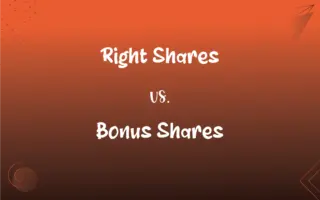Now vs. Then: What's the Difference?
Edited by Janet White || By Harlon Moss || Published on November 23, 2023
"Now" refers to the current moment or period, while "then" indicates a past time or a time following a certain event.

Key Differences
"Now" is used to denote the present time or moment, emphasizing immediacy or the current situation. "Then," on the other hand, refers to a specific time in the past or a time subsequent to a referenced event or condition.
In various contexts, "now" can indicate a change of situation from the past to the present, while "then" is often used to compare past situations with the present, or to denote a sequence of events.
"Now" is a key word for expressing current actions or states, often used to draw attention to the immediacy of an event. In contrast, "then" is used to refer to a previous point in time or what comes next in a sequence.
Both words can function adverbially but have different implications. "Now" can also be used to introduce statements or commands, while "then" can be used to imply consequences or results.
"Now" often carries a sense of urgency or importance, emphasizing the present. "Then" might evoke nostalgia or contrast, reflecting on past circumstances or changes over time.
ADVERTISEMENT
Comparison Chart
Temporal Reference
Refers to the current moment or period
Indicates a past time or subsequent time
Contextual Usage
Emphasizes the present situation
Used for past references or sequences
Expression of Time
Highlights immediate actions or states
Refers to past events or future sequence
Grammatical Function
Often introduces statements or commands
Implies consequences or results
Emotional Connotation
Urgency and importance of the present
Nostalgia or change from past to future
ADVERTISEMENT
Now and Then Definitions
Now
Indicates the current time.
We need to start the meeting now.
Then
Indicates a past moment.
Back then, things were simpler.
Now
Urges immediate action.
Solve this problem now.
Then
Describes the next step in a sequence.
First do this, then that.
Now
Marks a change from past to present.
Now, we do things differently.
Then
Shows the result of an action.
If you work hard, then you’ll succeed.
Now
Begins statements or commands.
Now, let’s consider the alternative.
Then
Elicits feelings about the past.
Then, we used to gather around the radio.
Now
Describes the existing condition.
The situation is under control now.
Then
Compares past with present.
I was younger then.
Now
At the present time
Goods now on sale.
The now aging dictator.
Then
At that time
I was still in school then. Come at noon.
I'll be ready then.
Now
At once; immediately
Stop now.
Then
Next in time, space, or order; immediately afterward
Watched the late movie and then went to bed.
Then
In addition; moreover; besides
It costs $20, and then there's the sales tax to pay.
FAQs
What does "now" typically refer to?
It refers to the current time or moment.
Is "now" a temporal adverb?
Yes, it's an adverb of time.
Is "now" used in commands?
Yes, it's commonly used to introduce commands.
Does "then" have a nostalgic connotation?
Often, it can evoke nostalgia or reflection.
How is "then" used in a sentence?
It refers to a past time or the next step in a sequence.
Does "then" always refer to the distant past?
No, it can refer to any past time or subsequent event.
How does "then" express consequence?
It's used to show the result of a condition or action.
How does "then" function in conditional sentences?
It shows the outcome in conditional constructs.
Can "now" indicate urgency?
Yes, it often conveys a sense of urgency.
Can "then" be used in storytelling?
Yes, it's frequently used to narrate sequences or past events.
Can "now" introduce a change of subject?
Yes, it can be used to shift topics.
Can "now" be used to compare times?
Yes, especially to contrast the past with the present.
Does "now" have variations in meaning?
Its meaning can vary slightly based on context.
Is "now" limited to literal present?
Not always; it can have a broader, contextual meaning.
How does "then" function in comparisons?
It contrasts past situations with current ones.
Is "then" used in historical contexts?
Yes, it's common in historical references.
How does "then" indicate sequence in instructions?
It marks the next step or action to take.
Does "then" imply a logical sequence?
Often, it indicates a logical progression of events.
Is "now" used differently in spoken vs. written English?
It can have a more immediate, urgent sense in speech.
Can "now" be used rhetorically?
Yes, for emphasis or to make a point.
About Author
Written by
Harlon MossHarlon is a seasoned quality moderator and accomplished content writer for Difference Wiki. An alumnus of the prestigious University of California, he earned his degree in Computer Science. Leveraging his academic background, Harlon brings a meticulous and informed perspective to his work, ensuring content accuracy and excellence.
Edited by
Janet WhiteJanet White has been an esteemed writer and blogger for Difference Wiki. Holding a Master's degree in Science and Medical Journalism from the prestigious Boston University, she has consistently demonstrated her expertise and passion for her field. When she's not immersed in her work, Janet relishes her time exercising, delving into a good book, and cherishing moments with friends and family.






































































